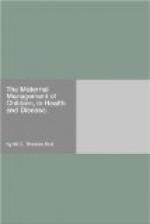Again; the return of the monthly periods whilst the mother is a nurse always affects the properties of the milk, more or less, deranging the stomach and bowels of the infant. It will thus frequently happen, that a few days before the mother is going to be unwell, the infant will become fretful and uneasy; its stomach will throw up the milk, and its motions will be frequent, watery, and greenish. And then, when the period is fully over, the milk will cease to purge. It is principally in the early months, however, that the infant seems to be affected by this circumstance; for it will be generally found that although the milk is certainly impaired by it, being less abundant and nutritious, still, after the third or fourth month it ceases to affect the infant. Is then a mother, because her monthly periods return after her delivery, to give up nursing? Certainly not, unless the infant’s health is seriously affected by it; for she will generally find that, as the periods come round, by keeping the infant pretty much from the breast, during its continuance, and feeding him upon artificial food, she will prevent disorder of the child’s health, and be able in the intervals to nurse her infant with advantage. It must be added, however, that a wet-nurse is to be resorted to rather than any risk incurred of injuring the child’s health; and that, in every case, partial feeding will be necessary at a much earlier period than when a mother is not thus affected.
The milk may also be rendered less nutritive, and diminished in quantity, by the mother again becoming pregnant. In this case, however, the parent’s health will chiefly suffer, if she persevere in nursing; this, however, will again act prejudicially to the child. It will be wise, therefore, if pregnancy should occur, and the milk disagree with the infant, to resign the duties of a nurse, and to put the child upon a suitable artificial diet;—if, however, pregnancy should take place before the infant is six month’s old, a wet-nurse ought to be procured.
From irregular nursing.—This is one of the most frequent sources of derangement of the stomach and bowels of the child. The infant that is constantly at the breast will always be suffering, more or less, from flatulence, griping, looseness of the bowels, and vomiting. This is caused by a sufficient interval not being allowed between the meals for digestion. The milk, therefore, passes on from the stomach into the bowels undigested, and the effects just alluded to follow. Time must not only be given for the proper digestion of the milk, but the stomach itself must be allowed a season of repose. This evil, then, must be avoided most carefully by the mother strictly adhering to those rules for nursing which have been already laid down.[FN#34]
[FN#34] See page 5.
From teething.—The bowels of the infant at the breast, as well as after it is weaned, are generally affected by teething. And it is fortunate that this is the case, for it prevents more serious affections. Indeed, the diarrhoea that occurs during dentition, except it be violent, must not be subdued; if, however, this is the case, attention must be paid to it. It will generally be found to be accompanied by a swollen gum; the freely lancing of which will sometimes alone put a stop to the looseness: further medical aid may, however, be necessary.




